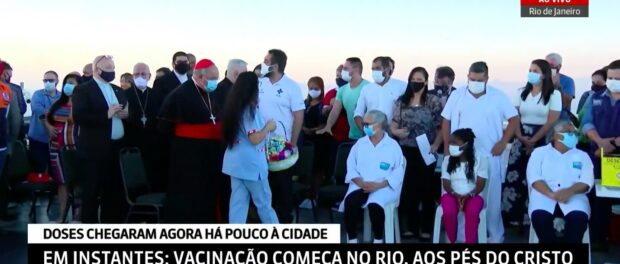
Rio city government assures Family Health Clinics will receive shots. But will favelas be prioritized in the vaccination plan?
On Wednesday, January 20, the Rio de Janeiro city government began immunizing health professionals at their place of work. Senior citizens and people with disabilities living in long-term care facilities are also being inoculated at these locations.
During a press conference transmitted via YouTube on Monday, January 18, the city government detailed how the first 110,000 doses of CoronaVac will be administered to the Covid-19 vaccination priority groups in Rio. At no point, however, was a vaccination plan aimed at favelas presented. According to the Covid-19 in Favelas Unified Dashboard, which brings together over twenty civil society organizations and collectives, as of January 20, 28,314 people in favelas had been infected and 3,067 died due to coronavirus. Rio de Janeiro has 6,718,903 inhabitants, with 22-24% of this population living in favelas, according to Data Rio, the city’s government’s Instituto Pereira Passos’s database.
For Theresa Williamson, urban planner and executive director of Catalytic Communities,* the organization coordinating data entry for the Covid-19 in Favelas Unified Dashboard, the city needs to devise a specific vaccination plan for favelas. “It is important to think of favelas as a priority group because we know they are among the areas in our city made most vulnerable during the pandemic. There are also many elderly people staying home with children who missed an entire year of school, suffering a lifelong loss when compared to another portion of society that did not lose a year of learning,” she said.
The immunization schedule set up by city government divided the population according to age groups, prioritizing the elderly and frontline healthcare workers. In this phase, the following will be immunized: (1) senior citizens aged 60 or over and living in long-term care facilities; (2) professionals working in long-term care facilities (nursing homes); (3) healthcare professionals working directly with Covid-19 and at ERs (approximately 34% of the municipality’s healthcare workers); and (4) indigenous peoples. All professionals will be vaccinated at their place of work. All people connected to nursing homes will be immunized at nursing homes.
According to Daniel Soranz, Rio’s municipal secretary of health, the city received 110,000 doses, representing a portion of the 231,840 it will receive of the six million made available by the São Paulo state biomedical center, Instituto Butantan, for the whole country. The remaining doses will remain with the state government and are reserved for the second dose of the first group of immunized individuals.
As vacinas devem chegar as clínicas da família da cidade do Rio ainda amanhã para iniciar a campanha de vacinação na quarta-feira, feriado, aniversário da cidade, dia de São Sebastião!
— Rene Silva (@eurenesilva) January 18, 2021
The vaccines should arrive at Rio’s family clinics by tomorrow so the vaccination campaign can begin on Wednesday—a holiday, the city’s birthday, Saint Sebastian’s day!
Eduardo Paes, Rio’s mayor, warned that although the beginning of vaccination is a victory for science, that does not exempt citizens from continued precautions against the illness. The administration emphasized that, at the moment, no one should seek out immunization centers for vaccination.
“The beginning of immunization is not the end of the pandemic; it is literally a light at the end of the tunnel. We will continue with the measures we have been announcing in the previous weeks,” said Paes, who promised more stringent monitoring and enforcement against crowding and non-compliance to rules by Rio’s establishments.
The first doses were received with a ceremony at the foot of Christ the Redeemer, Rio’s symbol, on January 18. Under a media spotlight, two Rio de Janeiro residents were vaccinated as journalists and photographers crowded in front of them.
MAS A FOTO FICOU BONITA. É O QUE IMPORTA, TALKEY https://t.co/35dcJMrv3I
— Cecília Olliveira (@Cecillia) January 18, 2021
Original tweet by Nicolás Satriano: Cinematographers and photojournalists during the vaccination “event” in Rio, at the Christ statue.
Cecília Olliveira’s tweet: But the photo looks good. That’s what matters, OK?
Next Phases
In the next phase (the date of which remains undefined since it depends on either the batch produced by national public health foundation Fiocruz being ready or another batch being sent from Butantan), additional health-care professionals will be immunized, as well as senior citizens 80 and older, divided by age groups.
When this phase of vaccination begins, senior citizens will be separated by age in order to prevent crowding at vaccination centers. In the first week, people 95 and older will receive their shots on Monday and Tuesday and people 90 to 95 from Wednesday to Friday. On Saturday, all of those in this age group will be able to go to the centers to be immunized.
Minha mãe está no grupo da primeira fase de vacinas aqui no Rio. Tô feliz pra carai!!!!!!
— Nega Rê 🏴 (@RenataTrajano1) January 18, 2021
My mom’s in the group for the first phase of vaccines here in Rio. I’m so freakin’ happy!
Family Health Clinics will be used as the base for vaccinations, from 8am to 10pm. There will, however, be other centers across town. In Santa Cruz, the Policlínica Lincoln will also offer shots, though only during the senior citizen phase (60 and older).
The first phase of vaccination also expects to include people 75 and older, quilombolas and health-care workers not yet vaccinated. However, the beginning of inoculation for these groups depends on the arrival of more batches of the vaccine.
In collaboration with Letycia Nascimento
*Both RioOnWatch and the Covid-19 in Favelas Unified Dashboard are initiatives of the NGO Catalytic Communities (CatComm).

